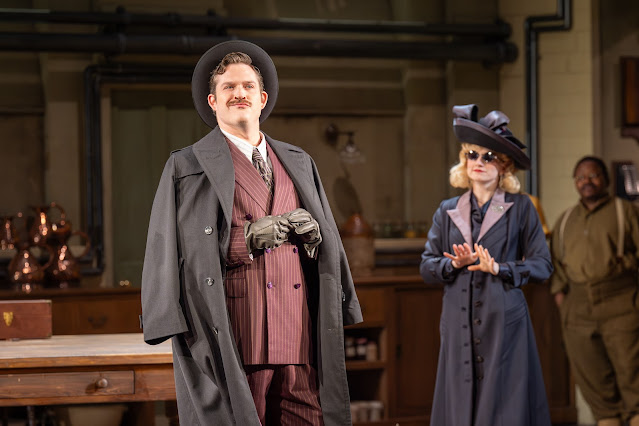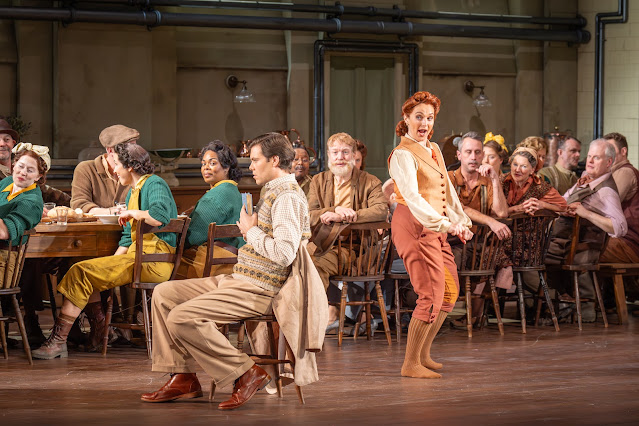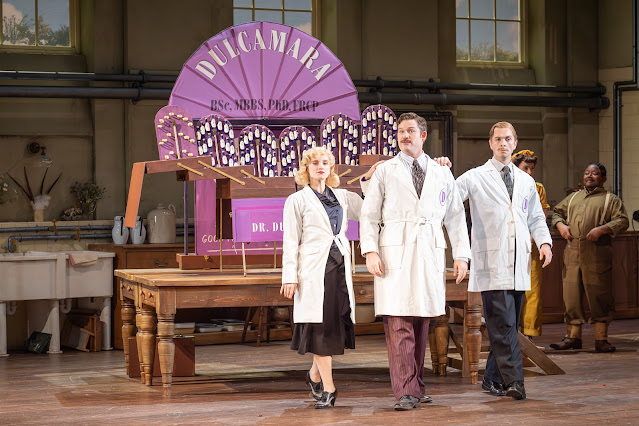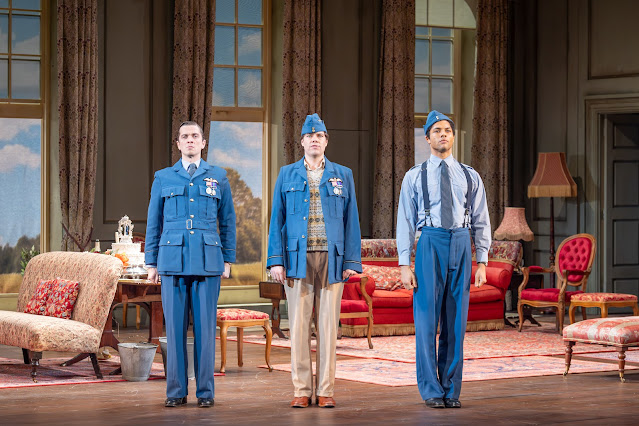 |
| Donizetti: The Elixir of Love – Brandon Cedel, Bridget Lappin – English National Opera, 2024 (Photo: Marc Brenner) |
Donizetti: The Elixir of Love (L’elisir d’amore); Brandon Cedel, Rhian Lois, Thomas Atkins, Dan D’Souza, director: Harry Fehr, conductor: Teresa Riveiro Böhm; English National Opera at the London Coliseum
Reviewed 15 November 2024
Reset to the England of the 1940s, Fehr’s production misses some of the warmth of Donizetti’s comedy but the evening was redeemed by glorious performances particular from Rhian Lois and Thomas Atkins
Harry Fehr worked at English National Opera as a young assistant director some twenty years ago and has now returned to direct ENO’s new production of Donizetti’s The Elixir of Love (L’elisir d’amore), an opera last seen in the house in 2011 in Jonathan Miller’s rather strange transposition of the opera to 1950s South-West America.
The Elixir of Love, directed by Harry Fehr with sets by Nicky Shaw and costumes by Zahra Mansouri opened at the London Coliseum on Friday 15 November 2024. The conductor was Teresa Riveiro Böhm, the Austrian Spanish conductor was Leverhulme Conducting Fellow with the Royal Conservatoire of Scotland in association with the BBC Scottish Symphony from 2019 to 2021, then Associate Conductor of Welsh National Opera for 2022/23. Rhian Lois was Adina, Thomas Atkins was Nemorino, Brandon Cedel was Dulcamara, Dan D’Souza was Belcore and Segomotso Shupinyaneng was Gianetta.
L’elisir d’amore is an opera that can take any number of settings, but it seems to work best when the production concentrates on the characters and does not try to hard with the settings. One of the reasons why Laurent Pelly’s production at Covent Garden worked so well [see my 2012 review on Opera Today] is that Pelly did not push the period setting to hard.
 |
| Donizetti: The Elixir of Love – Thomas Atkins, Rhian Lois – English National Opera, 2024 (Photo: Marc Brenner) |
Fehr and his designers set the opera in the 1940s England, a country house (owned by Rhian Lois’ Adina) taken over for the war and filled with land girls and RAF. As a concept it worked well enough, but Fehr seemed to have watched one too many episodes of Dads Army, and the whole was enveloped in the idea of it as a sitcom, complete with cod video titles (designer Matt Powell) at the beginning and end. I am reliably informed that the designers managed to get the colours of both the RAF uniforms and those of the land girls wrong, though whether this was deliberate or accidental, I am unclear.
One of the reasons why Donizetti’s comedies have stayed in the repertoire is that there is a warmth to them, he creates genuine characters. Unfortunately, what Fehr’s production did was to push the other element of the operas, their cruelty. For all the fine singing and engaging performances, Fehr seemed to just miss the right tone.
It did not help that the important class element of the opera was lacking. The setting, with the land girls and officers in occupation of a country house, meant that we had a fairly classless structure and then there was Thomas Atkins’ Nemorino. He was no longer a farm work employed by Lois’ Adina, instead he was simply mooning about the house, Hugh Grant style. It was never quite clear who he was. And at the opening of the opera, it was Atkins’ Nemorino who was reading the tale of Tristan and Isolde, then Lois’ Adina snatched it off him and started reading and laughing. Immediately, the scene becomes Adina laughing at Nemorino’s tastes rather than at the story itself. A streak of cruelty to begin.
 |
| Donizetti: The Elixir of Love – Dan D’Souza – English National Opera, 2024 (Photo: Marc Brenner) |
Rhian Lois made an engaging and appealing Adina, changeable and flirty, yes, but nothing more. For much of Act One she simply took Atkins’ Nemorino for granted. The important moment was in her Act Two duet with Brandon Cedel’s Dulcamara, when Adina sings, in character, about preferring her farmhand to the rich man, but here this registered on Lois’ Adina as well. It helped that in her Nemorino she had such a real partner as Atkins. He was quite a find, bringing a charming lyricism to the role and an appealing underdog feel. He was never hammily dim and his dogged devotion to Adina had real charm to it. But this is a bel canto opera and the relationship between the two characters is delineated via music which requires capability in this respect (something that does not always happen).
Both Lois and Atkins were stylish and engaging in the ornamental passages, each able to spin a fine line. Lois brought a perky charm to her music which gave this Adina real personality, whilst Atkins spun such a lovely line in moments like ‘Una furtiva lagrima’. Then in the important scene with the two of them in Act Two, they struck sparks off each other in just the right way. Thankfully, there was little that was ‘Sitcom’ about these two, and we really did invest in their characters.
Brandon Cedel’s Dulcamara was an American spiv, with Cedel using, I think, his natural American accent. He was given two sidekicks, dancers Reece Causton and Bridget Lappin, and the three brought visual elan but also an element of the sinister to their opening Act One presentation. This Dulcamara was not simply the aimable showman, there was a sinister and slightly nasty edge to him. Cedel made Dulcamara more heartless than some, though it is really all there in the music. Cedel has a fine bass-baritone voice and this was well-sung account of the role, unfortunately his way with the text was less impressive. His account of Dulcamara’s opening solo was rather less than ideal as a patter song. Ultimately, this was a quite serious account of the role, well sung but not really funny. Or is that me being a grump.
 |
| Donizetti: The Elixir of Love – Bridget Lappin, Brandon Cedel, Reece Causton – English National Opera, 2024 (Photo: Marc Brenner) |
Dan D’Souza made a finely sung but for me he was a rather unlikeable Belcore. This Belcore was seriously up himself and his behaviour to Atkins’ Nemorino was rather nasty. As I have said, there is a real element of cruelty to Donizetti’s comedies, and here the production did not hide it. And in the recruitment scene, Belcore had two dancer side-kicks, Reece Causton and Suleiman Suleiman to further intimidate Nemorino with (impressive) physical jerks. D’Souza’s Belcore was not an aimable buffoon, there was nothing commedia dell’arte about him, he had a real streak of supercilious git about him.
Segomotso Shupinyaneng made an appealingly characterful Gianetta. To a certain extent a thankless role, but Shupinyaneng gave it her all and I look forward to hearing her in a more rewarding role.
Donizetti wrote the opera for a theatre rather smaller than the London Coliseum, and the music was probably performed by a smaller, more lithe ensemble than was present at the Coliseum. The large chorus was tasked with bringing the backdrop to this version of the drama to life, and this they did with a will, with plenty of the individual choristers giving us real sense of character. In the pit, Teresa Riveiro Böhm encouraged the orchestra to bring big band style to the music, this was full blooded but tempi were apposite and lively, though she made time and space for the more bel canto elements.
 |
| Donizetti: The Elixir of Love – Reece Causton, Thomas Atkins, Suleiman Suleiman – English National Opera, 2024 (Photo: Marc Brenner) |
This was an evening rescued in the second half by the finely engaging performances of Rhian Lois and Thomas Atkins, their combination of character and style meaning we enjoyed their singing and cared for what happened to them. But these were set in the context of a production that seemed to miss the essential warmth of Donizetti’s comedy. I may be in the minority, as the first night audience seemed to enjoy everything I did not!
The blog is free, but I’d be delighted if you were to show your appreciation by buying me a coffee.
Elsewhere on this blog
- Life enhancing: the Orchestra of the Age of Enlightenment in Bach’s Brandenburg Concertos – concert review
- By some strange piece of magic, it works: Dancing Queen from Asya Fateyeva & Lautten Compagney Berlin mixes Rameau with the songs of ABBA – record review
- Colour, movement and tradition: Juan Diego Florez in Offenbach’s The Tales of Hoffmann at Covent Garden – opera review
- Powerful intensity, youthful vigour: Benjamin Hulett & Helen Charlston in Handel’s Jephtha at in Wimbledon – concert review
- Much more than a guilty pleasure: the songs of Reynaldo Hahn at the London Song Festival – concert review
- The sound of wind, sunlight or water: pianist Anna Tsybuleva on her new recording of Debussy’s Préludes on Signum Classics – interview
- A bright beginning: Three Sonatas reveals the distinctive voice of young composer Sam Rudd-Jones in chamber music that intrigues – record review
- Provoking the inner senses: Mendelssohn’s Elijah in the majestic surroundings of King’s College Chapel, Cambridge – concert review
- Gentle Flame: Liz Dilnot Johnson’s diverse output showcased in this disc celebrating her relationship with Ex Cathedra – record review
- Forging ahead: Specializing in the performance of Wagner operas, the London Opera Company in Siegfried – opera review
- Home









